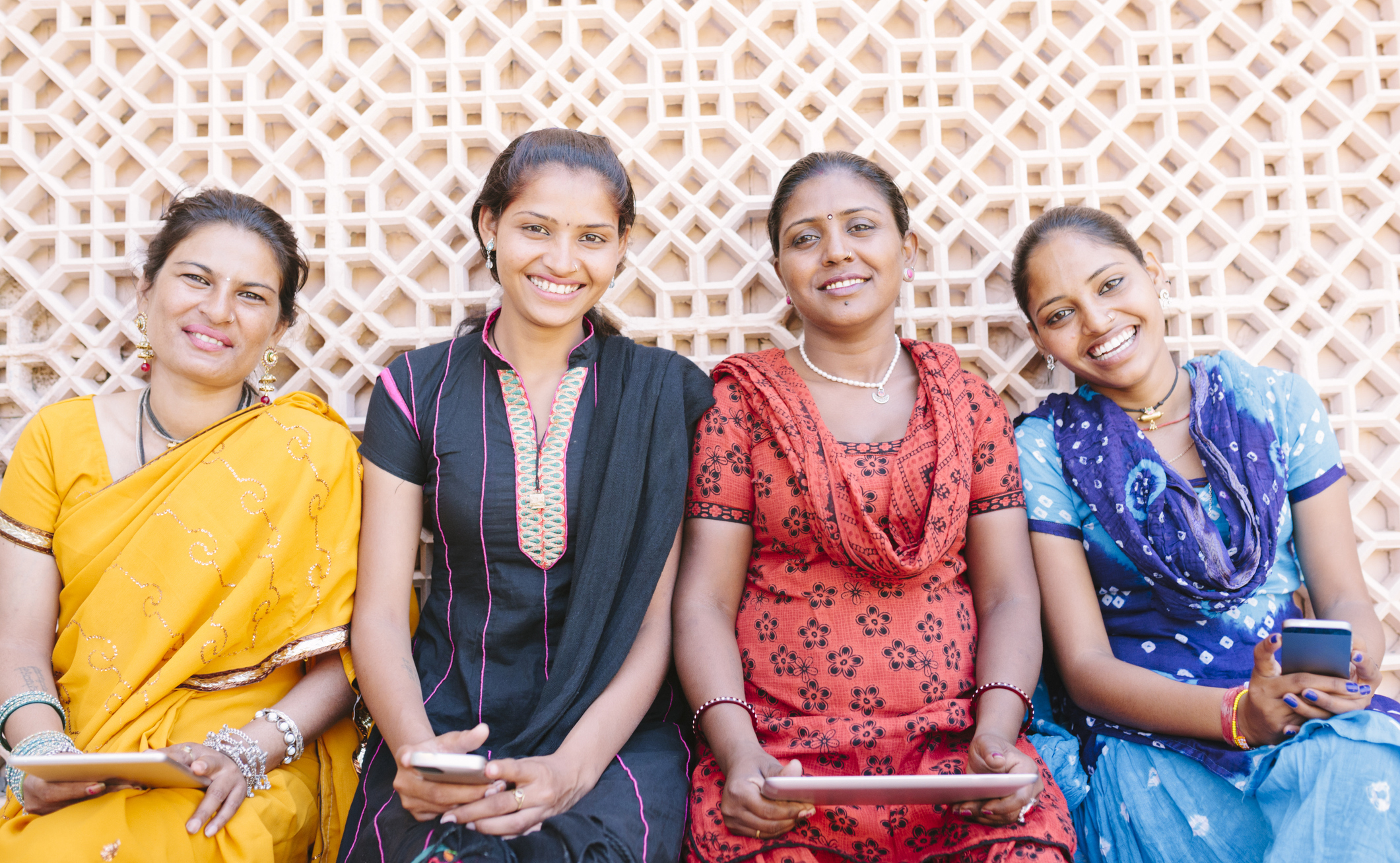
The Global Center on Adaptation has selected the 20 shortlisted finalists for the 2023 Local Adaptation Champions Awards in four categories: Capacity Building, Business Adaptation Solutions, Innovation in Devolving Finance, and Women in Leadership. The Local Adaptation Champions Awards spotlight and reward inspiring, innovative, and scalable locally led efforts to address climate change impacts and build effective resilience.
The 20 finalists were selected by a global Technical Advisory Group comprising climate experts. More than 500 applications were received from individuals and organizations worldwide who have implemented or are implementing climate change adaptation or resilience interventions that follow one of the eight Principles for Locally Led Adaptation.
“We are thrilled to announce the top 20 finalists responsible for inspiring and innovative locally led adaptation initiatives. This year we received an overwhelming number of applicants, including from new geographies, such as the Caribbean and Latin America. This is indicative of the Awards’ growth and crucially a increasing number of locally led efforts to combat climate change,” said Anju Sharma, the Global Lead on Locally Led Adaptation at the Global Center on Adaptation.
The four winners will be presented with their awards at a ceremony at COP28 in Dubai, United Arab Emirates, on 8 December. A high-level jury will select one winner in each category. Each of the four winners will receive €15,000 and benefit from sponsorship from the Adaptation Fund, including participating in the Fund’s prominent readiness and learning-and-sharing events.
The 20 Finalists Pioneering Climate Adaptation and Resilience
WOMEN IN LEADERSHIP CATEGORY
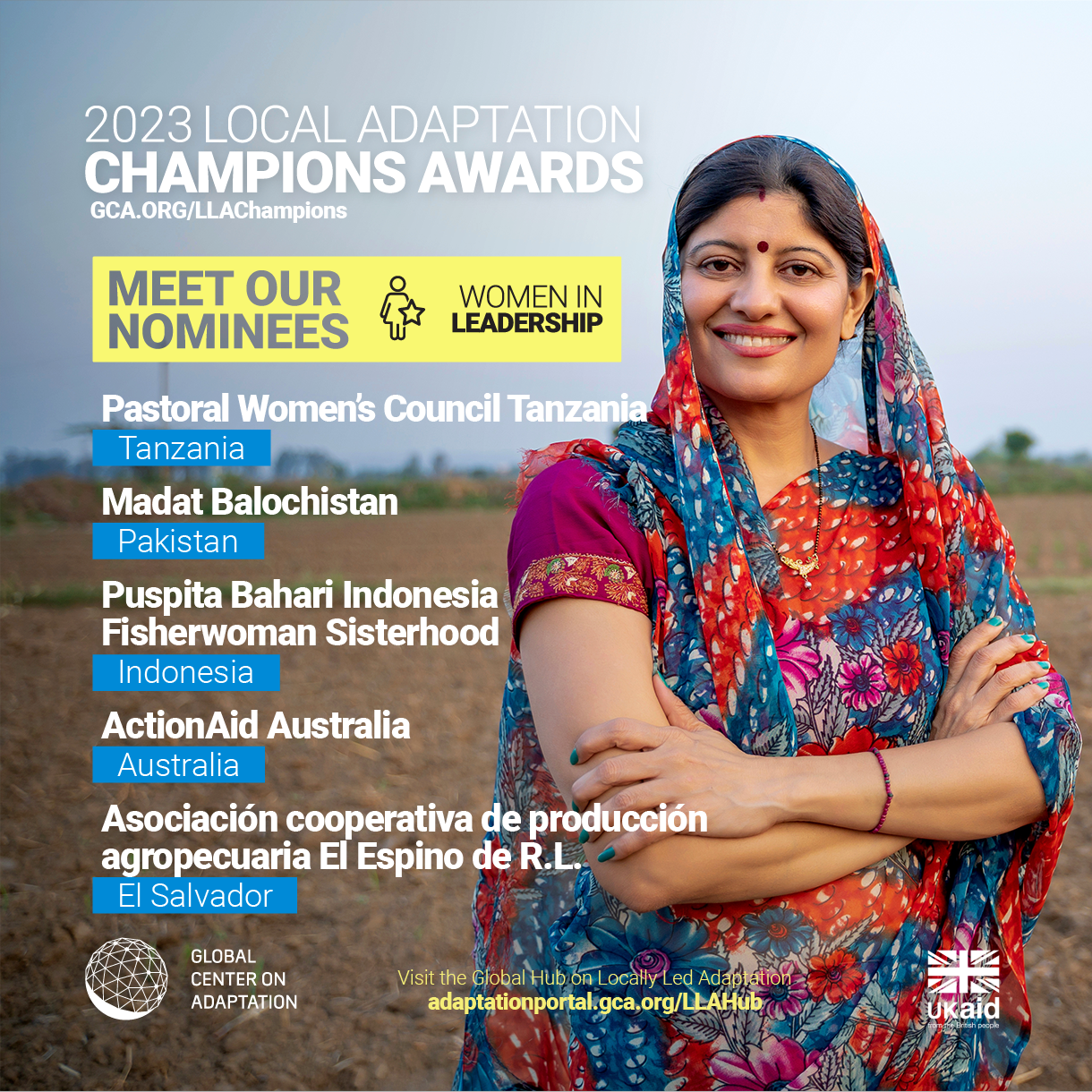
Pastoral Women’s Council Tanzania
In three provinces of northern Tanzania, the Pastoral Women’s Council Tanzania enhances Indigenous pastoralist women’s leadership capabilities to build women’s capacity to achieve equality as decision-makers in pastoralist societies. The Lake Natron Community has been nominated for its members’ commitment to implementing its action plans in a region that is particularly vulnerable to climate change-related hazards like droughts and flooding, which threaten livelihoods and create food insecurity. Ruth Kihiu, Head of Programs, explains that empowering women is vital to ensure activities implemented address their priorities: “Although pastoralist men and women are equally exposed to climate shocks and stress, women have fewer opportunities to access and control productive resources or engage in alternative climate resilience livelihoods and incomes. Their knowledge of the environment is crucial but often goes ignored in drought-mitigation and adaptation strategies.”
Maryam Jamali
Madat Balochistan is a woman-led initiative in Gandakha, Balochistan, a region of Pakistan that has seen successive destructive floods. Members of the community have designed and built climate change-resilient homes that are quick to build, protect inhabitants from extreme heat and rainfall, and can be easily relocated if the land is flooded or inhabitants are evicted by landowners. “This project was started by my community, for my community. We knew our people, land, and climate,” Maryam Jamali, Co-Founder and Primary Organizer of Activities, explains, adding that the initiative has given local people autonomy and agency: “For once, we were not reduced to beneficiaries, but were actively involved in rehabilitating, adapting, and protecting ourselves.” So far, more than 250 homes have been built and the initiative has reached more than 1,250 people in this community.
Asociación Cooperativa de Producción Agropecuaria El Espino de R.L.
In El Salvador, the Asociación Cooperativa de Producción Agropecuaria El Espino de R.L., also known as the El Espino Cooperative, produces and sells coffee grown in the Arenal Monserrat micro-basin of San Salvador, an area prone to fires in the dry season and landslides and floods in the rainy season. María Lidia Martínez Cañas has grown coffee all her life and has been associated with the cooperative for 20 years. She has been nominated for leading the implementation of a pilot called Nature-Based Solutions (NbS). “Given the national climate change scenarios, coffee cultivation must move to incorporate multifunctional sustainable practices that prepare farmers to produce coffee under new conditions, prevent the effects of climate change, and mitigate damage,” Martínez Cañas says of the importance of this adaptation initiative. NbS builds climate resilience and reduces farmers’ vulnerability to climate variability by increasing water infiltration and preventing erosion.
Puspita Bahari/Indonesia Fisherwoman Sisterhood
In several coastal villages in Indonesia, Puspita Bahari/Indonesia Fisherwoman Sisterhood (PPNI) is working to empower fisherwomen and strengthen the connections between them. By developing a solidarity movement among women in small-scale fisheries, the initiative enhances fisherwomen’s confidence and capacity to address climate change. Masnuah, leader at Puspita Bahari and member of Indonesia Fisherwoman Sisterhood, has been nominated for her work at the local, district, and national levels. Masnuah explains that the project is also concerned with increasing understanding of the role of women in climate change adaptation: “Women’s contribution to the fisheries sector, including regarding climate issues, tends to be invisible. But so many women are initiators or actors for change.” Masnuah is also the chair of the Southeast Asia in World Forum of Fisher Peoples and recognizes the need for collaboration: “Solidarity is the key to collective action for addressing the problem.”
ActionAid Australia
Flora Vano has been nominated for her work as Country Director of ActionAid Vanuatu (AAV), an ActionAid Australia project that supports women in Vanuatu, and particularly for spearheading the WITTT Sunshine initiative, which is led by women with disabilities, focuses on their unique needs and priorities, and supports their collective efforts to ensure inclusive humanitarian responses. As Sarah Bayjoo, Philanthropy and Partnerships Manager at ActionAid Australia explains, “In a climate-related disaster-prone country like Vanuatu, the intersectional discrimination faced by women with disabilities fuels their increased vulnerability in times of crisis.” The WITTT Sunshine network reduces the vulnerability of women with disabilities to climate change by providing them with training and tools to lead disaster preparedness for themselves and the disability community. “WITTT Sunshine ensures women with disabilities are not just recipients of aid but are leading the response,” Bayjoo adds.
BUSINESS ADAPTATION SOLUTIONS CATEGORY
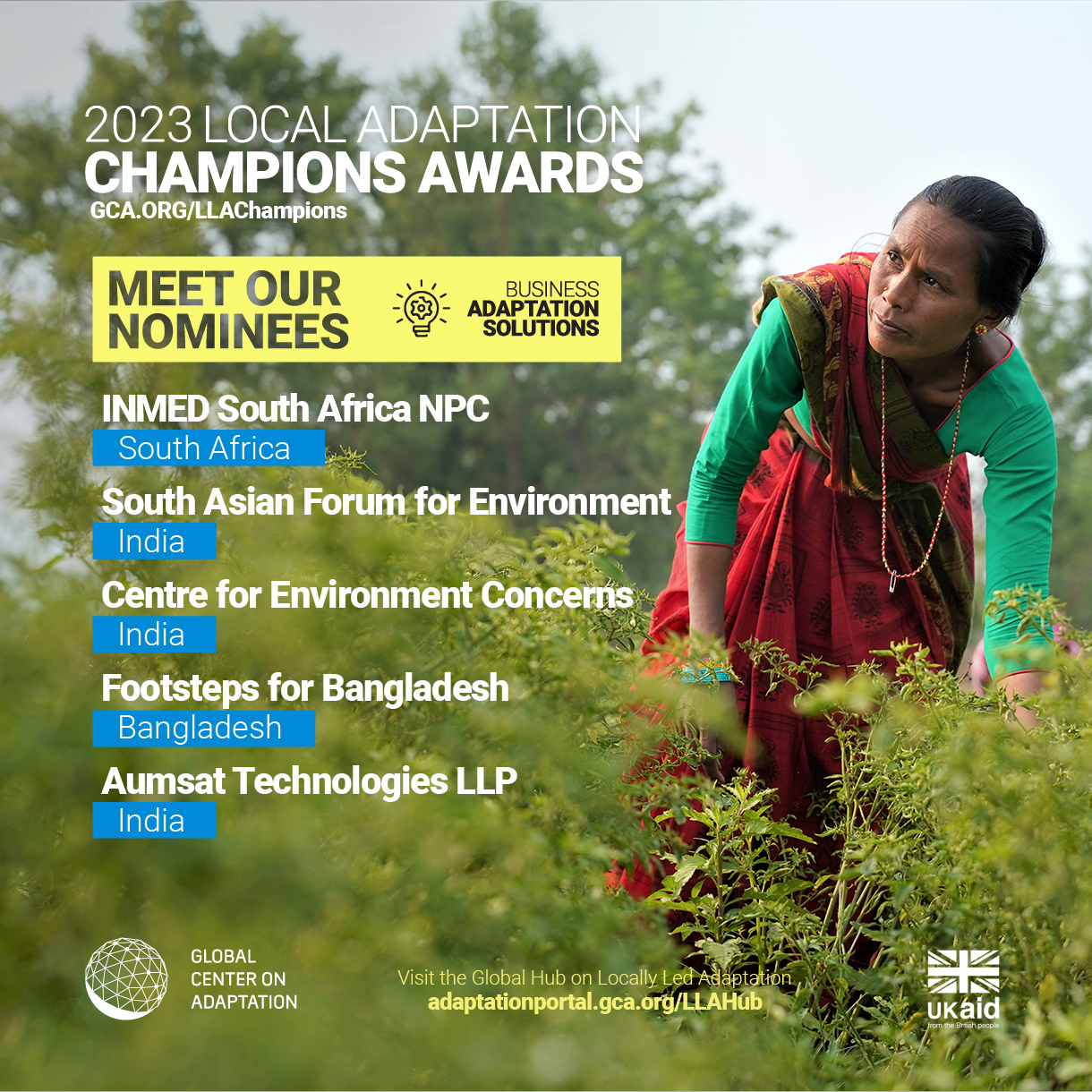
South Asian Forum for Environment
The India-based South Asian Forum for Environment has implemented flood-resilient hydroponic float-farming in coastal communities in India, Bangladesh, and Cambodia, and implementation is also planned in Sri Lanka. This method of farming benefits places where rising sea levels have negatively impacted income and food security by using grow-bags filled with recycled organic soil, harnessing solar power, and utilizing a micro-irrigation system to effectively farm fish and crab. As Dipayan Dey, who heads the research and innovation team, explains, carbon-neutral float-farming has many possibilities: “This floating infrastructure can also support livestock and can work as storage for food and grain, which are essential for adapting to climate impacts.” This intervention has already proved its resilience to climate hazards including two super-cyclones, and it has directly benefited 22,750 beneficiaries in 10 coastal villages in India alone.
INMED South Africa NPC
INMED South Africa NPC launched its climate-smart Aquaponics Social Enterprise (ASE) model as a means to address the intersectional causes of poverty, including food security, climate change adaptation, and inclusion. As Director of INMED South Africa NPC Unathi Sihlahla explains, “As a result of climate change and other factors, South Africa is facing a crisis in food production.” Through a network of physical and virtual training sites and mentorship programs for farmers and producers, the ASE model aims to transition historically disadvantaged populations from subsistence to commercial agriculture production, thus enabling food security and economic self-sufficiency. The ASE model also includes learning centers in public primary and secondary schools and universities: “We believe that the long-term opportunities for children’s success in life depend on the existence of strong families and healthy communities,” Sihlahla added. This initiative is currently being implemented in nine provinces in South Africa.
Centre for Environment Concerns
The System of Water for Agriculture Rejuvenation (SWAR) was co-created by the Centre for Environment Concerns and farmers in India to improve plant growth on farms facing severe water shortages. SWAR provides an alternative to drip irrigation systems and addresses groundwater scarcity, soil health, heatwaves, and resilience to climate change. The system employs a moisture diffuser embedded at the plant-root level, and data from a portable moisture probe aids irrigation plans and avoids overwatering while reducing water application by up to 50%. SWAR is currently employed by 500 small farmers, including 200 women, who cultivate diverse crops in drought-prone areas of India, but Santana Gopal Komandur, Director of the project, explains that their future aims are far-reaching: “Over time, we will cover all drought-prone, water-scarce areas in India and mainstream this learning and impact to inform tropical regions.”
Footsteps Bangladesh
In flood-prone regions of Bangladesh, floods often destroy traditional water sources and thousands of plastic bottles of drinking water are distributed in emergency response kits. Shah Rafayat Chowdhury, Co-Founder and President of Footsteps Bangladesh, saw this as an opportunity to develop the right technology to convert flood water into drinking water. He created the Dreamwater Filter, a portable, lightweight filtration device that can be carried anywhere and used anytime to convert any type of surface water, especially flood water, into drinking water. This also creates income generation for the community during off-flood season, as individuals can become agents who sell water door to door or technicians who service the filters. “The potential of Dreamwater is immense, as it is able to harness a disaster and transform it into both opportunity and hope for people affected by floods nationwide,” Chowdhury notes.
Aumsat Technologies LLP
In India, Aumsat Technologies LLP has innovatively harnessed satellite-based radar analytics to address the pressing issue of water scarcity exacerbated by climate change. Riddhish Soni, Chief Executive Officer, utilized his experience on the Chandrayaan-2 lunar mission to develop Aumsat, a revolutionary device that analyzes satellite data to pinpoint underground water sources and optimal locations for groundwater recharge sites. Aumsat can find pipeline leaks in 10-meter-thick concrete and pinpoint precious water sources 60 meters underground, and the device has an impressive accuracy rate of 90%, far exceeding the roughly 28% success rate of traditional techniques like dowsing with twigs and coconuts. As Soni explains, “Aumsat emerged as a beacon of hope, seamlessly bridging the marvels of space technology with pressing earthly concerns, illuminating a path toward a more hydrated and hopeful future for India.”
CAPACITY BUILDING CATEGORY
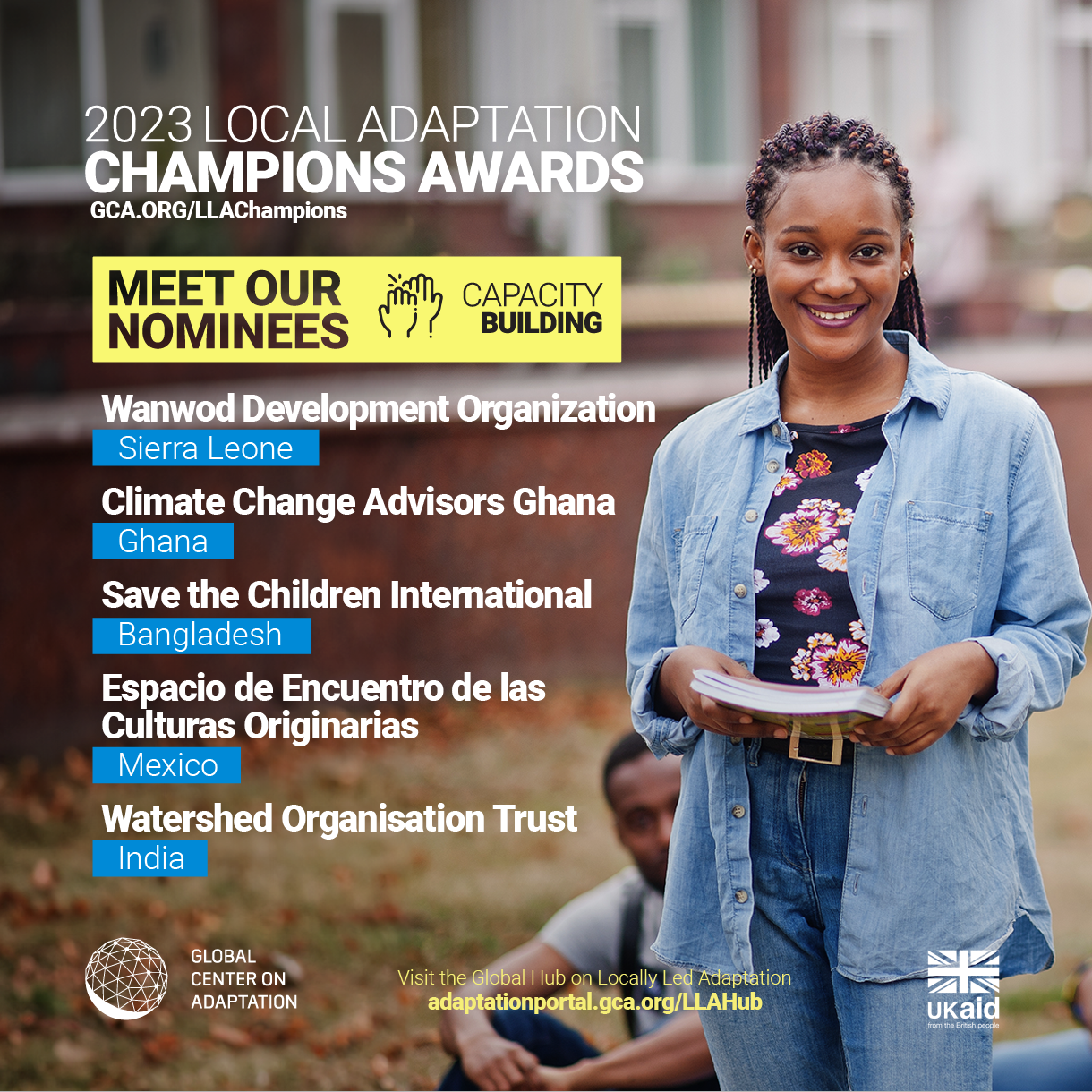
Wanwod Development Organization
With its philosophy of “cut one, plant two,” Wanwod Development Organization has established a 20-acre farm in Sanda Magbolontor chiefdom, Sierra Leone, where polyclonal varieties of cashew nut are grown that have the potential to withstand future climate-related issues. Farmers’ Business School initiatives also provide climate adaptation and resilience training that encourage more women and organizations to engage in climate-driven agricultural practices. “It is clear that agriculture, done right, is the best means the world has today to simultaneously tackle food security, climate crisis, inequality, and environmental extinction,” explains Dumbuya Komrabai, Founder and Executive Director. The demo farm ultimately allows farmers to see and understand the benefits of agricultural practices that are sensitive to the climate, which addresses deforestation due to wood burning, the timber trade, and mining that have led to poor yields, a scarcity of safe drinking water, and food insecurity.
Climate Change Advisors Ghana
In Ghana, Climate Change Advisors Ghana is bridging the gap between traditional wisdom and modern science by integrating Indigenous knowledge that has been accumulated over generations with contemporary climate science and adaptive practices. Workshops, training sessions, and knowledge-sharing events that bring together farmers, community leaders, and climate change advisors provide community members with practical insights into climate-resilient practices, sustainable resource management, and financial literacy. Executive Director Dzifa Francis Ahadzi says the project directly contributes to reducing vulnerability to climate-related shocks and fosters long-term resilience within these communities: “These capacity-building efforts enable community members to identify and prioritize climate vulnerabilities, design resilience plans, and access funds to implement these plans effectively.” The initiative was initially implemented in Abrafo but has now been extended to diverse landscapes in Agona East and the Mfantseman Municipal.
Save the Children International
The PROYASH project has been implemented by Save the Children International in three cities of Bangladesh to mitigate vulnerability to unpredictable urban hazards. In Dhaka North City Corporation, Chattogram City Corporation, and Savar Municipality, urban volunteer groups, women’s groups, and children and youth groups work with Ward Disaster Management Committees to strengthen emergency preparedness, particularly in informal settlements comprised of climate migrants who have moved from rural to urban locations. “This community-based resilience model emphasizes community awareness and an enhanced level of preparedness at the family, community, and institutional levels through effective collaboration between the community and stakeholders,” Simon Rahman, Manager of Urban Resilience, explains. Training in topics such as emergency response, search and rescue, fire safety, and first aid enable volunteers to actively spearhead campaigns and engage in advocacy initiatives. “These efforts have encouraged cleaner, greener, and safer cities,” Rahman adds.
Espacio de Encuentro de las Culturas Originarias, A.C.
Espacio de Encuentro de las Culturas Originarias, A.C. focuses on adaptation to climate change at the local level in highly vulnerable communities in Oaxaca, a region of Mexico that sees frequent droughts, frosts, and cyclones. The project engages communities in the development and implementation of ecotechnologies like dry toilets, energy-saving stoves, fog catchers, and garden irrigation systems. As General Coordinator Tzinnia Carranza López explains (in Spanish), “Communities involved in this project benefit from affordable, relevant, and innovative ecotechnologies that make them better able to adapt to extreme weather events.” Members of the community attend workshops outlining the theoretical and practical elements of these ecotechnologies, which means people have the skills and knowledge to strengthen their community resilience. “Utilizing ecotechnologies means people can produce their own food using agroecological techniques that are more resilient to extreme weather events,” Carranza López adds.
Watershed Organisation Trust
In India, Watershed Organisation Trust (WOT)aims to bolster rural resilience against climate change through three key measures: soil and water conservation measures that aids irrigation during periods of scant rainfall, water resource development which promotes micro-irrigation technology to address water-scarce conditions and utilizes village water budgeting, and soil health and productivity enhancement that employs climate-resilient agricultural practices. Robin Abraham, Deputy General Manager and Head of Communications emphasizes the importance of community engagement: “Farmer groups anchor our approach, aligning solutions with local realities.” He adds, “Communities lead with a ‘learning by doing’ model, and WOT is committed to nurturing community champions, pivotal throughout and beyond the project’s lifecycle.” So far, the project has implemented various watershed interventions in more than 2,000 hectares of land, reducing crop losses and improving germination of soybeans, pulses, and cotton.
INNOVATION IN DEVOLVING FINANCE CATEGORY
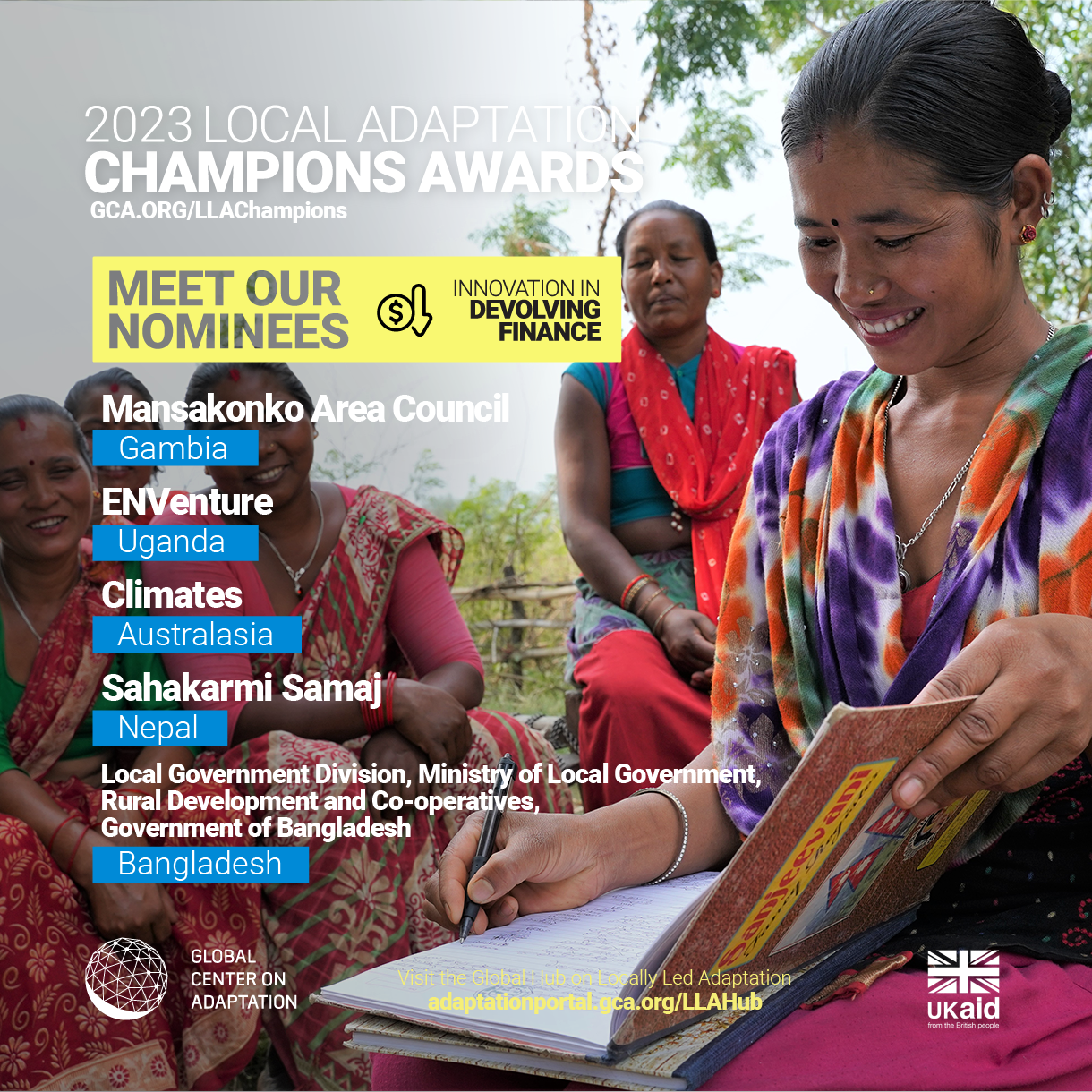
Mansakonko Area Council
Mansakonko Area Council has implemented the Local Climate Adaptive Living (LoCAL) Facility mechanism for climate finance delivery in The Gambia to deliver national funds to the local level, where the impacts of climate change are most acutely experienced. LoCAL was implemented through the Jobs Skills and Finance Program, including “Cash for Work” actions that provided community members with funding to implement adaptation projects or learn new skills like masonry or engineering. “Communities are able to identify what they need to best adapt and thrive and even take part in the work to realize their ambitions,” says Landing B. Sanneh, Chairman of Mansakonko Area Council. The LoCAL Facility is being implemented in 17 countries across Africa, Asia, and the Pacific, and 17 more countries are currently planning LoCAL actions. But while LoCAL is a global mechanism, it is implemented at the local level and responds to locally identified and articulated needs.
Local Government Division, Ministry of Local Government, Rural Development and Co-Operatives, Government of Bangladesh
In Bangladesh, the Local Government Initiative on Climate Change (LoGIC) is enhancing communities’ ability to plan and finance local adaptation actions that suit their needs and contexts. Through this project, Local Government Division, Ministry of Local Government, Rural Development and Co-Operatives, Government of Bangladesh provides a mechanism for accessing and managing climate finance from various sources, a platform for sharing best practices and lessons learned, and a system for monitoring and evaluating effectiveness and impact. Mohammed Fazla Azim, Joint Secretary and National Project Director, describes LoGIC as a participatory and inclusive process: “By facilitating access to markets and financing, the project enables climate-vulnerable communities to upscale adaptive practices, diversify income sources, and invest in climate-resilient livelihoods based on traditional knowledge at both national and local levels.” LoGIC is currently operating in nine districts in Bangladesh.
ENVenture
ENVenture supports off-grid communities in Uganda to access clean energy by enabling access to affordable clean energy products. Six energy kiosks operated by refugee entrepreneurs have been set up in BidiBidi and Kiryandongo settlements, empowering communities by bridging the digital divide and ensuring access to clean energy technology despite limited internet penetration. Julius Mujuni, Country Director, says, “This project is a crucial response to the pressing need for clean and affordable energy solutions among vulnerable populations, particularly refugees in Uganda.” Mujuni explains that the project fosters economic growth and alleviates challenges such as physical distance and the low purchasing power of women: “We empower refugee entrepreneurs with training, connections to quality energy suppliers, and grants or zero-interest loans.” ENVenture aims for a sustainable energy landscape by boosting livelihoods and curbing environmental harm through clean tech adoption.
Climates
The Micro Grants program implemented by Australasia-based Climates has supported projects in Fiji, Vanuatu, Papua New Guinea, and several other island states. Farema Yazdi, Managing Co-Director, explains: “Climates was founded in 2015 by people who felt disempowered by the scale of climate change in the Australia-Pacific region.” The Micro Grants program thus addresses the experiences of many communities who, despite being on the frontlines of the climate crisis, face barriers accessing resources to respond to climate change. Micro Grants fill small-scale funding gaps to support local visions of climate resilience and back projects that face barriers to attracting large-scale capital. Funding terms are flexible and grants are available without complicated application or reporting processes, and so far, these grants have supported a range of projects from coral rehabilitation and disaster resilience workshops to installing water tanks and climate-resilient infrastructure.
Sahakarmi Samaj
The Water Justice Fund established by Sahakarmi Samaj is a response to the critical intersection of climate change and water, which has had severe consequences for communities in Nepal, particularly for women and girls. The Fund provides women leaders in Gauriganga and Banglachuli with direct access to funding and empowers their decision-making authority to shape adaptation strategies. As Ammar Bahadur Air, Executive Director, explains, the Fund’s participatory model ensures decisions regarding grant utilization are made by the women and girls who are most impacted by the climate change issues being addressed: “Through this approach, we foster a heightened sense of accountability in fund utilization and ensure that community members are engaged in decision-making from start to finish.” “By focusing on marginalized individuals and communities, structural inequalities are addressed while strengthening community responsiveness to climate challenges,” Air adds.